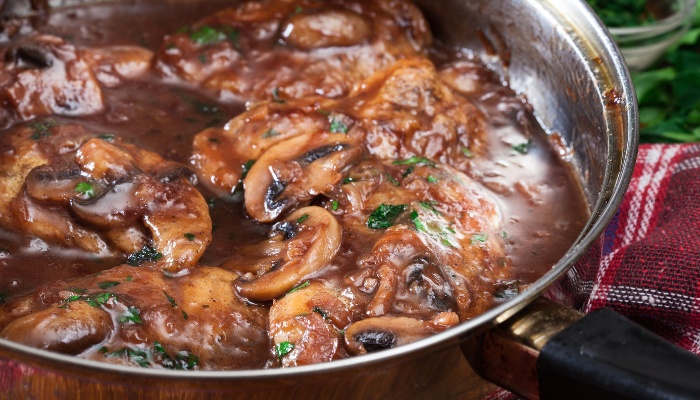If you are pregnant or attempting to become pregnant, you may be concerned about which foods are advised to avoid.
Alcohol is obviously not advised during pregnancy, but what about foods with traces of alcohol in them and dishes that are grilled, marinated, and baked in certain alcoholic drinks?
While there is no known safe amount of alcohol during pregnancy, alcohol is markedly reduced during the cooking process of most dishes. The pan size, cooking time, and specific cooking methods will affect the amount of leftover alcohol. Check with your doctor if you are unsure about certain foods.
Most of the dishes cooked with alcohol contain too small an amount to worry about, but it’s helpful to know how your food is prepared to be sure of the alcoholic content.
To help with this, we’ll look at the extent to which alcohol can be cooked out of food, boozy foods to avoid at all costs, and answers to common concerns about alcohol in food.
Alcohol in Food During Pregnancy
Alcohol can impact your baby’s health while pregnant, but this can be hard to avoid completely when some dishes are cooked in the stuff.
Let’s first address alcohol’s effects in pregnancy before looking at how certain cooking methods can reduce traces of alcohol.
Effects of Alcohol During Pregnancy
According to the CDC and the UK National Health Service, consuming alcohol during pregnancy can put women at higher risk for miscarriage and stillbirth in addition to risking premature birth and low birth weight.
Alcohol can also lead to serious developmental issues in your baby.
A baby’s liver is one of the last organs to mature, and since they cannot process alcohol well, greater exposure to alcohol can increase their risk of developing a fetal alcohol spectrum disorder (FASD).
This condition can lead to things like:
- Abnormal facial features and a small head size
- Learning difficulties such as speech and language delays
- Shorter-than-average height
- Poor memory, attention, and concentration
- Low IQ or intellectual disabilities
- Heart, bone, or kidney issues
- Vision and hearing problems
- Hyperactivity
- Poor coordination
Does Alcohol Cook Out of Food?
It is possible for some of the alcohol to evaporate during the cooking process, but the actual amount burned off can depend on many factors, according to dietician Barbara Gordon at Idaho State University.
These factors include:
- The specific cooking method (boiled or grilled)
- The specific alcohol source
- The size of the pan the food is cooked in (a pot/pan with a larger surface area allows more of the alcohol to evaporate)
- The other ingredients in a dish, such as toppings that may prevent the alcohol from evaporating — for example, bread crumbs layered on a dish cooked in white wine sauce.
According to the author of On Food and Cooking: The Science and Lore of the Kitchen Harold McGee, “it’s impossible to cook out all of the alcohol” as a small amount of alcohol molecules remain bonded to water and other molecules present in the food even after extensive heating.
Below is an estimate for the alcohol remaining in food depending on time and cooking methods:
| Cooking Method | Cooking Time | Alcohol Remaining |
| Baking | 15 minutes | 40% |
| Sautéing | 5 minutes (stirred into food then removed from heat) | 80-85% |
| Simmering | 20 minutes/1 hour | 40%/20% |
| Boiling | 30 minutes | 10% |
| Grilling | 5 minutes | 75% |
| Broiling | 5 minutes | 90-100% |
| Flambéing | 2-3 minutes (until flames have died down) | 75% |
Cooking With Wine While Pregnant
According to nutritionists at Pregnancy Food Checker, recipes with wine, such as chicken marsala and beef bourguignon, should be safe during pregnancy as they are typically low in residual alcohol.
The same is true for foods cooked in wine sauces like red wine bolognese as the cooking process removes some of the alcohol.
Adding wine to dishes yourself while cooking is not recommended as the quantities may be unsafe.
Accidentally Ate Food With Alcohol While Pregnant
Foods that are cooked in alcohol normally contain fairly low levels of it, whether this is beer-battered foods, seafood bisques, or ribs marinated in liquor.
Foods like this should be okay in moderation, with beer-cooked dishes posing the lowest risk as beer is lower in alcohol compared with wine or spirits.
Accidentally Ate Dessert With Alcohol While Pregnant
Compared with main dishes containing alcohol, a lot of desserts are not cooked or baked, meaning some will contain neat levels of alcohol that are not burned off.
Certain desserts containing small, safe levels of alcohol include certain ice creams, cakes, and tiramisu, but be cautious of desserts specifically labeled with alcohol as a main feature such as Christmas puddings, chocolate liqueurs, and marinated fruit.
If you unknowingly ate a dessert with alcohol already, there’s no way to undo it, and the odds are favorable that no harm was done, so try not to beat yourself up about it.
Foods That Contain Alcohol

- Meat dishes braised in wine can include chicken marsala, risottos, coq au vin, beef bourguignon, cioppino, cacciatore
- Any meat or seafood dishes that have been flambéed before being braised such as lobster in brandy or cognac
- Pork ribs marinated in hard liquor such as bourbon or whisky and BBQ sauces containing wine or spirits
- Stews and pie dishes cooked in ale/beer or wine
- Beer-battered fish dishes and Welsh rarebit
- Meat sauces such as wine/vodka sauce
- No-bake desserts containing neat alcohol
- Baked goods with certain flavoring extracts
There are also less obvious sources of alcohol, such as foods containing natural forms of it, including:
- Bread – small amounts of alcohol are produced by yeast and other bacteria during fermentation.
- Very ripe bananas – the brown spots on overripe bananas contain small traces of alcohol.
- Fruit juices – according to Baby 2 Body, some brands of apple, orange, and grape juice tested for less than 1 gram of alcohol, which is produced during the harvesting process when heat is introduced.
- Yogurt and kefir – also have a small alcohol content along with other fermented dairy products.
- Kombucha tea – this produces a small amount of alcohol during fermentation, though kombucha tea is probably best avoided in pregnancy anyway due to the caffeine content and the fact that the tea isn’t always pasteurized.
Safe Amount of Alcohol During Pregnancy
According to the CDC, there is no safe amount of alcohol to consume while pregnant, and all types of alcohol are considered equally harmful to your baby.
Alcohol use in the first three months of pregnancy is believed to be the most dangerous for your baby’s health, and the sooner you stop alcohol use, the better the outcome for your baby’s development.
Specialist in fetal medicine Robyn Horsager-Boeher, M.D., at UT Southwestern Medical Center explains that while heavy drinking (9 or more drinks per week) poses a definite risk, the same level of conclusive information isn’t available regarding low-level alcohol consumption (1-4 drinks per week).
Horsager-Boeher ultimately states that the decision to drink during pregnancy is a personal decision based on the guidelines and the risks each woman is willing to accept.
Foods With Alcohol To Avoid When Pregnant
The majority of savory dishes contain traces of alcohol too minute to be considered unsafe, but the worst offenders are no-bake desserts containing neat alcohol.
The following foods are best avoided:
- Bananas foster (made with rum flambé)
- Rum baba
- Rum balls
- Christmas pudding/plum pudding
- Bombe Alaska (often topped with hard liquor)
- Crepes Suzette
- Cocktail-flavored sorbet
- Alcoholic affogato (gelato drowned in espresso and liqueur)
- Grasshopper pie (often containing crème de menthe)
- Chocolate liqueurs
- Fruits marinated in flavored syrup
- Alcoholic ice cream flavors
- Flambéed fruit dishes like cherries jubilee
Substitutes for Alcohol in Recipes
Some great substitutions for alcohol are things that can add tartness to dishes, such as freshly-squeezed apple, grape, and orange juice.
A splash of vinegar or lemon juice can also be a good addition to savory dishes while flavored extracts such as vanilla and mint can be a good substitute in sweet dishes and confections in holiday recipes.
(Just so you know… vanilla extract contains alcohol too!)
Common Questions About Alcohol in Food While Pregnant
Can I Eat Penne Alla Vodka While Pregnant?
Yes, pasta dishes cooked in alcoholic sauce such as penne alla vodka are safe in moderation during pregnancy as these dishes are normally very low in alcohol levels and will be even lower in small portion sizes.
Is Vodka Sauce Safe During Pregnancy?
After simmering for 20 minutes, according to food science specialist Shirley Perryman, 40% of the alcohol is burned off.
So in a typical recipe calling for 8 ounces of vodka, this reduces a 1.34-ounce serving of vodka sauce to 0.84 ounces of vodka.
This leftover vodka is equivalent to more than half of a typical drink’s worth of vodka (1½ ounces), so depending on simmering times and portion sizes, vodka sauce cannot always be considered safe.
How Long To Boil Wine To Remove Alcohol?
It can take over 2 hours to boil the alcohol out of wine, and according to the US Dept. of Agriculture, a burgundy wine simmering for 2½ hours at 185 degrees Fahrenheit will still retain 4-6% of its ethanol content.
Does Alcohol Evaporate When Baked in a Cake?
Some alcohol will evaporate during the baking process, but as a guide, it’s typical that around 40% of the alcohol will remain after around 15 minutes of baking time.
Even after 2½ hours of baking, a cake may still retain about 10% of its alcohol content.
At What Temperature Does Alcohol Burn Off?
Food author Harold McGee explains that the molecules in alcohol will evaporate when alcohol reaches its boiling point of 173 degrees Fahrenheit.
“The higher the temperature, the quicker the evaporation.” However, “it’s impossible to cook out all of the alcohol.”
Closing Thoughts
In summary, consuming trace amounts of alcohol during pregnancy is a personal choice.
There’s no need to completely avoid cooked dishes that contain alcohol as levels are typically quite low and are reduced further during the cooking process.
“Cooked” is the operative word here though, as foods that are not cooked (like no-bake desserts) are likely to contain neat forms of alcohol that can pose higher health risks to your baby’s development and pregnancy outcome.
Rebecca is a seasoned copywriter and researcher with over a decade of experience, specializing in parenting topics. With a passion for all aspects of raising children, from breastfeeding to potty training.

